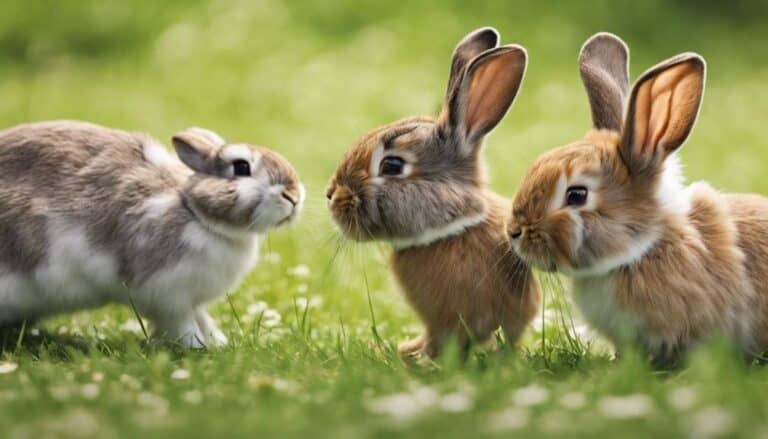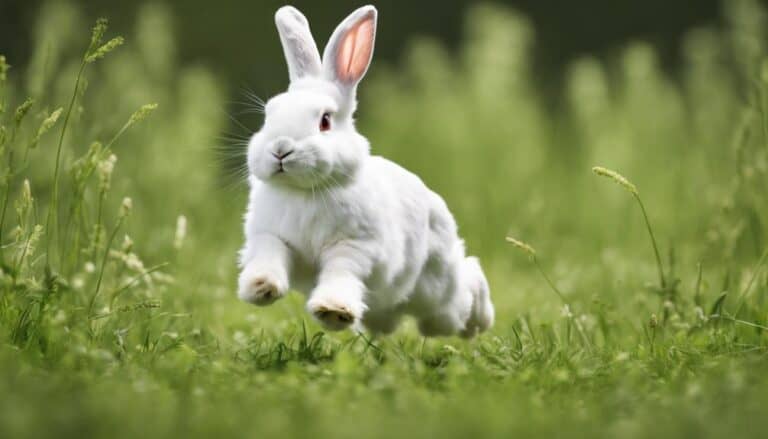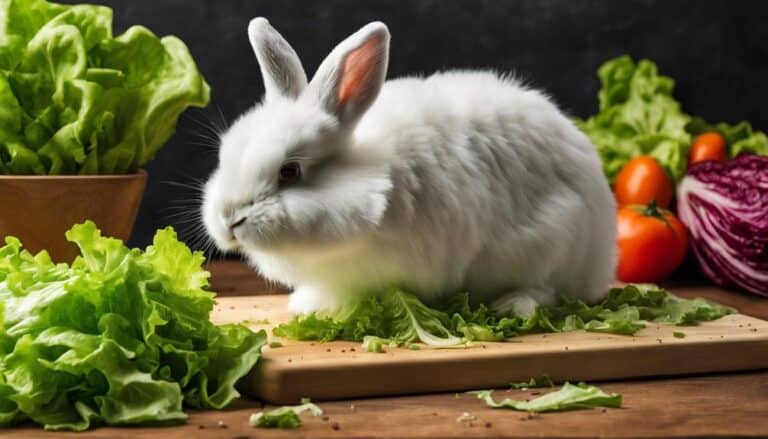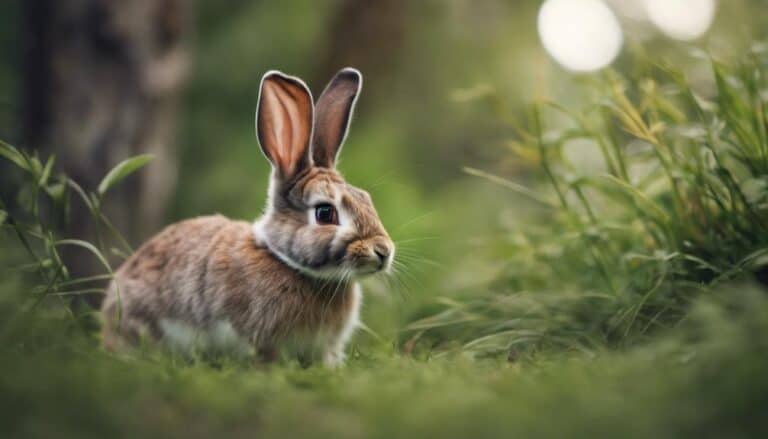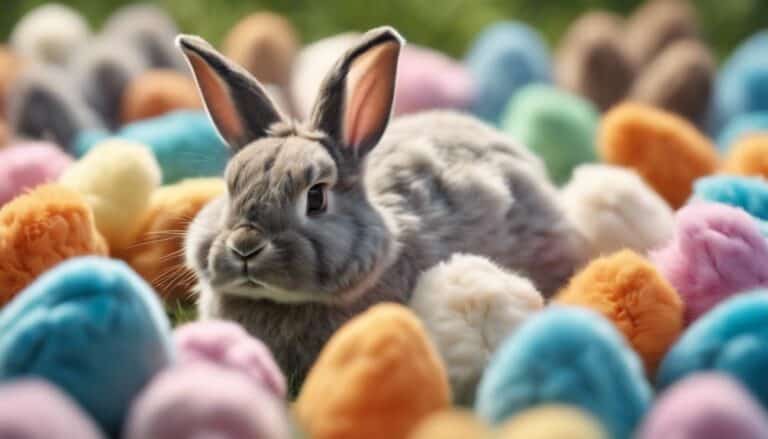If you're wondering whether bunnies can enjoy peanut butter as a treat, the answer may surprise you. While the concept of bunnies eating peanut butter seems harmless at first glance, there are important factors to think about before offering this spread to your furry friends.
The risks involved and the impact on their health might make you think twice about incorporating peanut butter into their diet. Before making a decision, it's vital to understand the potential consequences and explore alternative options that are better suited for your bunny's well-being.
Contents
- 1 Key Takeaways
- 2 Peanut Butter and Bunny Diets
- 3 Nutritional Value of Peanut Butter
- 4 Potential Risks for Bunnies
- 5 Safe Alternatives for Treats
- 6 Moderation: Peanut Butter Intake
- 7 Peanut Butter Vs. Peanuts for Bunnies
- 8 Best Practices for Bunny Treats
- 9 Is Avocado Safe for Bunnies to Eat, Like Peanut Butter?
- 10 Frequently Asked Questions
- 11 Conclusion
Key Takeaways
- Peanut butter poses risks like dental problems and digestive issues for bunnies.
- Nutritional concerns include high fat, sugar, and lack of essential nutrients.
- Opt for safe bunny treats like fresh veggies, fruits, and herbs instead.
- Prioritize high-fiber, low-fat treats to meet bunnies' nutritional needs and prevent health issues.
Peanut Butter and Bunny Diets
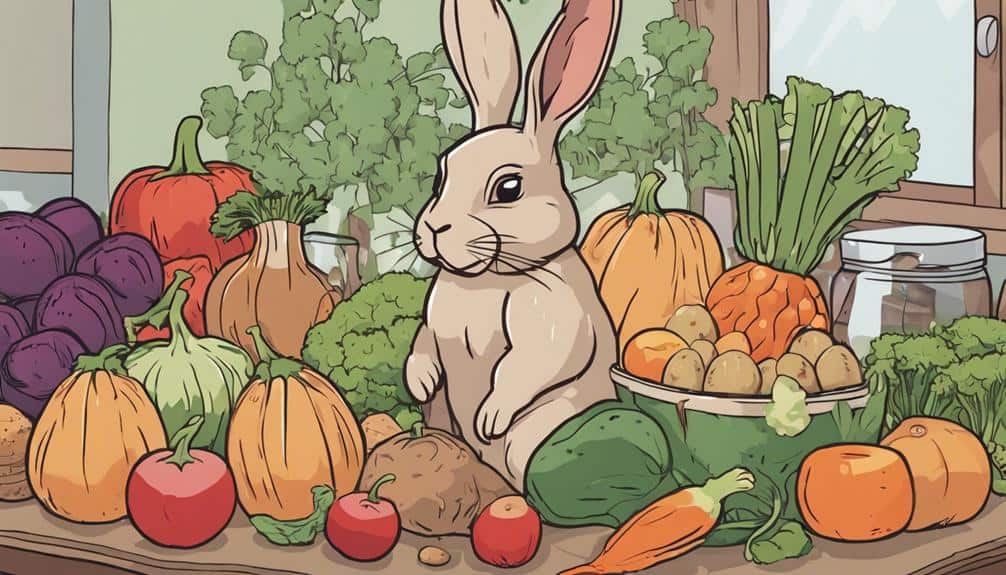
When considering the suitability of peanut butter for inclusion in bunny diets, it's essential to note the potential risks associated with this high-fat and calorie-rich food. Rabbits have specific dietary requirements that differ from those of humans or even other household pets. The high sugar content in peanut butter can lead to dental problems and digestive issues in rabbits. Their delicate digestive systems aren't equipped to handle the excess fats and proteins found in peanut butter.
To guarantee the well-being of your bunny, it's advisable to opt for safer treat alternatives such as fresh vegetables. Fresh vegetables provide essential nutrients, fiber, and hydration while being low in fat and sugar. By incorporating fresh vegetables into your rabbit's diet, you can help maintain a balanced nutritional intake and prevent potential health issues associated with high-fat and sugary foods like peanut butter. Remember, fresh vegetables are a healthier and more appropriate option for your bunny's dietary needs.
Nutritional Value of Peanut Butter
Considering the inappropriateness of peanut butter for bunny diets due to its high fat and sugar content, it's essential to understand the nutritional value of this popular spread. Peanut butter is indeed high in fat and proteins, containing approximately 16 grams of fat and 7 grams of protein per 2-tablespoon serving. While fats and proteins are necessary for rabbits in limited amounts, the excessive levels found in peanut butter can be detrimental to their health. The surplus fats can lead to obesity and liver complications, making it an unhealthy treat for rabbits. Additionally, peanut butter lacks the essential fiber needed for a rabbit's digestive system to function optimally, potentially causing digestive issues.
In addition, the added sugars present in peanut butter pose a risk to rabbits by potentially leading to dental problems and further digestive complications. Due to its high fat content, lack of fiber, and added sugars, peanut butter isn't suitable for inclusion in a rabbit's diet. It's pivotal to prioritize a balanced and appropriate diet to safeguard the well-being and health of your furry companions.
Potential Risks for Bunnies
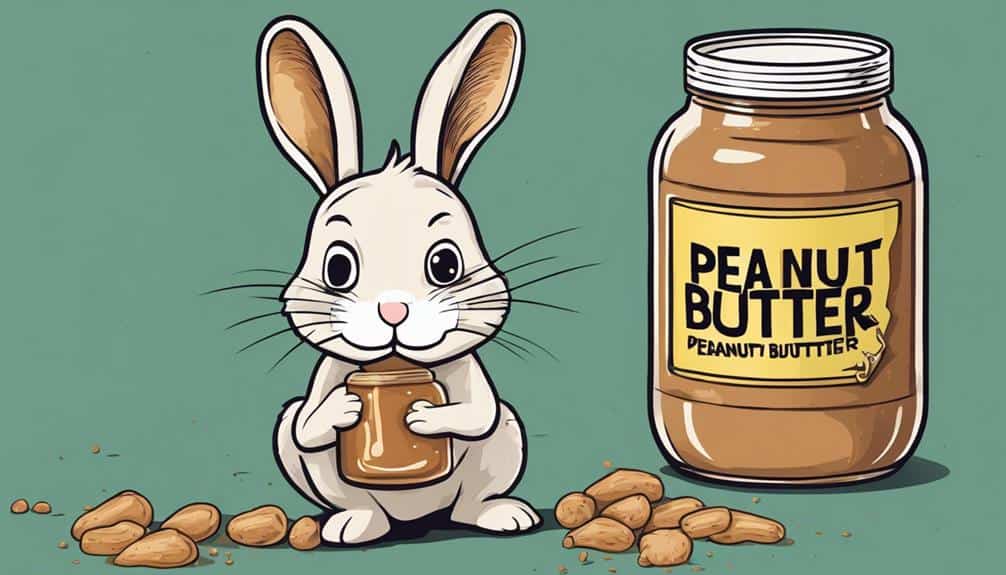
Be cautious when offering peanut butter to your bunny, as it can lead to digestive issues like diarrhea and gas.
Additionally, the sticky nature of peanut butter poses a choking hazard for your furry friend.
Allergic reactions are also a concern, so it's best to avoid feeding peanut butter to your bunnies altogether.
Digestive Issues in Bunnies
Digestive issues in bunnies pose potential risks that can be exacerbated by certain foods like peanut butter. When it comes to your fluffy companions, it's important to be mindful of what you feed them to maintain their well-being.
Here are some key points to take into account:
- High Sugar Content: Peanut butter's high sugar content can lead to digestive problems like diarrhea and gas in bunnies.
- Weight Gain: Overconsumption of peanut butter can result in weight gain for bunnies, potentially causing health issues.
- Hard to Digest: The high-fat content in peanut butter can be challenging for bunnies to digest, often causing diarrhea and dehydration.
- Lacks Essential Nutrients: Peanut butter lacks essential nutrients such as fiber and vitamins necessary for a rabbit's digestive health.
Being cautious with their diet ensures your bunnies stay healthy and happy.
Choking Hazard for Bunnies
Given the potential risks associated with peanut butter as a choking hazard for bunnies, it's essential to be mindful of the food choices you offer your furry companions.
Peanut butter's sticky texture poses a significant danger to bunnies as it can adhere to their mouths and throats, causing difficulty swallowing. This challenge may lead to rabbits struggling to clear the peanut butter residue, increasing the risk of choking.
Choking incidents can result in severe consequences for bunnies, including respiratory distress. To safeguard your bunny's health and well-being, it's advisable to steer clear of feeding them peanut butter altogether.
Prioritizing safe and suitable food options is vital in ensuring your bunny's safety and preventing potential choking hazards.
Allergic Reactions in Bunnies
When considering the potential risks for bunnies, allergic reactions to peanut butter can manifest through symptoms such as itching, swelling, and gastrointestinal distress. Here are some key points to be aware of:
- High Fat and Protein Content: Peanut butter's high fat and protein content can trigger sensitivities in rabbits, leading to allergic reactions.
- Gastrointestinal Distress: Bunnies may experience gastrointestinal issues like diarrhea or vomiting as a result of consuming peanut butter.
- Existing Food Allergies: Rabbits with existing food allergies or sensitivities are more prone to adverse reactions when exposed to peanut butter.
- Anaphylaxis Risk: In severe cases, allergic reactions to peanut butter can escalate to anaphylaxis and respiratory distress in bunnies.
It is important to observe your bunny closely for any signs of allergic reactions when introducing peanut butter into their diet.
Safe Alternatives for Treats
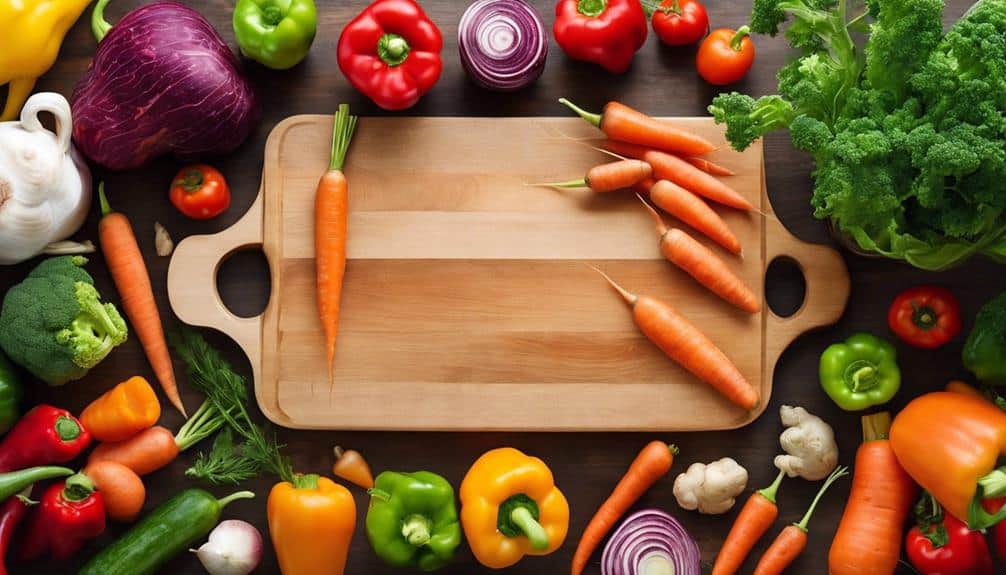
When selecting safe alternatives for treats for your bunny, prioritize fresh vegetables like leafy greens, bell peppers, and radishes. These options aren't only healthy treats for your rabbit but also provide essential nutrients for their well-being. Leafy greens such as romaine lettuce, kale, and spinach are excellent choices that can be given in small amounts as part of your rabbit's diet.
In addition to leafy greens, you can offer fruits in moderation as healthy treats. Apples, berries, and bananas are good options that can add variety to your bunny's diet. Remember to introduce new foods slowly and observe your rabbit for any adverse reactions to safeguard their safety.
Safe herbs like basil, mint, and cilantro can also be introduced as treats to diversify your rabbit's snack choices. By offering a mix of safe and nutritious snacks, you can keep your bunny entertained and healthy while avoiding harmful options like peanut butter.
Moderation: Peanut Butter Intake
To maintain your bunny's health and well-being, it's important to carefully regulate the intake of peanut butter due to its high fat and sugar content. When it comes to feeding your rabbit peanut butter, keep the following guidelines in mind:
- Small Quantities: Offer peanut butter in tiny amounts as an occasional indulgence to prevent overconsumption of its high-fat content.
- Fresh Veggies: Prioritize feeding your bunny fresh vegetables as treats instead of peanut butter to make sure a balanced diet and proper nutrition.
- Digestive Systems: Rabbits have sensitive digestive systems, making it important to limit their intake of high-fat foods like peanut butter to avoid potential digestive issues.
- High Content: Due to the high sugar content in peanut butter, it's advisable to avoid regular or large servings to prevent health complications in your furry friend.
Peanut Butter Vs. Peanuts for Bunnies
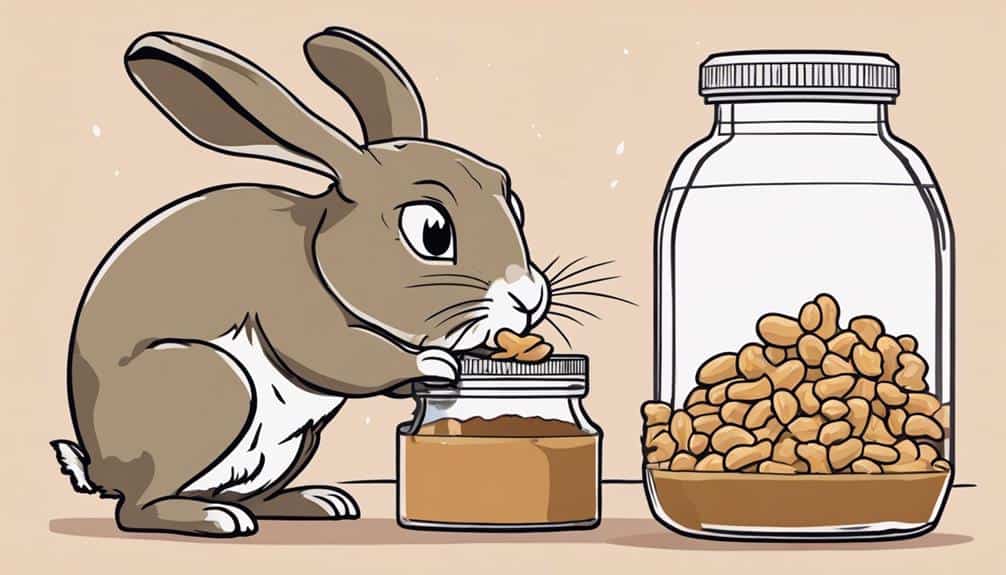
Comparing peanut butter to peanuts for bunnies reveals significant concerns regarding their high fat content and potential health risks. While both peanuts and peanut butter are not recommended for rabbits, peanut butter is especially problematic due to its higher fat concentration. Rabbits should not eat either peanuts or peanut butter as these foods can lead to stomach issues, obesity, and fatty liver disease. Both peanuts and peanut butter lack the necessary nutrients for a rabbit's diet, such as high fiber and essential vitamins. Additionally, wild rabbits do not include nuts in their natural diets, making them unsuitable for domestic bunnies. It is important to avoid feeding bunnies unprocessed peanuts or peanut butter to prevent potential health complications. Opting for healthier alternatives like fresh hay, leafy greens, and limited pellets is essential for maintaining your bunny's well-being.
| Concerns | Peanuts | Peanut Butter |
|---|---|---|
| High Fat Content | Yes | Yes |
| Stomach Issues | Possible | Possible |
| Processed Foods | No | Yes |
| Nutrient Deficiency | Yes | Yes |
Best Practices for Bunny Treats
When it comes to treating your bunny, opt for safe and nutritious options like fresh vegetables, fruits, and herbs to guarantee their well-being.
By limiting high-fat and high-sugar treats, you can prevent obesity and digestive complications in rabbits.
Remember to monitor your bunny's response to new treats and adjust quantities accordingly for a balanced diet.
Safe Treats for Bunnies
When selecting safe treats for your bunny, consider incorporating a variety of fresh vegetables such as leafy greens, bell peppers, and radishes to establish a balanced and nutritious diet.
Here are some tips for choosing safe treats for your bunny:
- Moderation: Offer fruits like apples, berries, and bananas in moderation to keep your bunny's diet balanced.
- Healthy Snack Options: Introduce safe herbs like basil, mint, and cilantro as healthy snack alternatives for your rabbit.
- Slow Introduction: When adding new foods, introduce them slowly to monitor any reactions or sensitivities your bunny may have.
- Variety is Key: Providing a diverse range of foods ensures your bunny receives the best nutrition for their health and well-being.
Nutritional Considerations for Bunnies
For peak bunny health, prioritize incorporating high-fiber, low-fat treats like fresh vegetables, fruits in moderation, and safe herbs into their diet. It's essential to think about the nutritional needs of your rabbit to prevent health issues such as obesity and digestive problems. Avoid feeding high-fat and low-fiber foods like peanut butter, as they can lead to obesity and liver complications due to the excess fats. Additionally, the lack of sufficient fiber in such treats can result in digestive issues for your bunny. Opt for safer alternatives that align with their dietary requirements to guarantee their well-being. Below is a table outlining suitable and unsuitable treats for your bunny:
| Suitable Treats | Unsuitable Treats |
|---|---|
| Fresh Vegetables | Peanut Butter |
| Fruits in Moderation | High-Fat Seeds |
| Safe Herbs | Processed Snacks |
Is Avocado Safe for Bunnies to Eat, Like Peanut Butter?
Yes, bunnies can eat avocados as long as the pit and skin are removed. The fruit itself is safe for bunnies in moderation. However, it’s important to note that avocados are high in fat, so too much can be harmful. Like with peanut butter, portion control is key when feeding bunnies avocados.
Frequently Asked Questions
Can Bunnies Lick Peanut Butter?
You should avoid letting bunnies lick peanut butter as it's not safe for them. Instead, offer healthy treats like fresh veggies or fruits as peanut butter alternatives. Choose safe spreads that are bunny-friendly to prevent any digestive issues.
What Foods Are Bad for Bunnies?
When considering foods bad for bunnies, be cautious with toxic plants, unsafe vegetables, harmful fruits, and dangerous treats. Guarantee their diet excludes these items to safeguard your rabbit's well-being and promote a healthy lifestyle.
Can Rabbits Eat Peanut?
You should avoid feeding rabbits peanuts due to their high fat content, which can lead to digestive issues and fatty liver disease. Instead, consider offering rabbit-safe treats like fresh fruits and vegetables as healthy alternatives.
What Is Toxic to Rabbits?
To keep your bunny safe, be cautious of plant toxicity, household dangers, poisonous plants, and ingested toxins. Prevent access to harmful substances like avocado, chocolate, raw rhubarb, sugary treats, and toxic plants to safeguard your rabbit's well-being.
Conclusion
To summarize, it's best to steer clear of feeding your bunnies peanut butter. Just like giving a fish a bicycle, peanut butter doesn't belong in a rabbit's diet.
Stick to safe treats like fresh veggies and fruits to keep your furry friends happy and healthy. Remember, a happy bunny is like a ray of sunshine on a cloudy day – keep them smiling by feeding them right!

